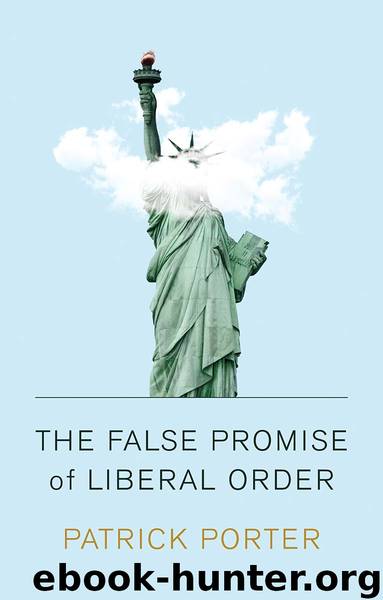The False Promise of Liberal Order by Patrick Porter

Author:Patrick Porter
Language: eng
Format: epub
ISBN: 9781509538690
Publisher: Wiley
Published: 2020-06-22T00:00:00+00:00
Vietnam is central to the argument. That war was one of the most significant attempts at world-ordering undertaken by an American government. The architects of the conflict sincerely believed it was a necessary act in protecting the US-led free world.80 In the crucial 1964–5 internal debate about the escalation of US ground commitment to support the South Vietnamese regime, planners inside the Johnson administration were aware that prevailing over communist insurgents in Vietnam would be complex and difficult.81 They believed the campaign was still worth it, to uphold many of the same imperatives espoused by believers of today’s liberal order, to prevent destabilizing chain reactions from undermining the alliance and commercial system. Hostile political waves, they feared, could become tsunamis that could undermine the free world, if not as regional dominoes, then as global revolutionary waves. If the USA failed to project credible resolve to an ally on the periphery, then it would undermine the faith of allies in Europe and Asia, leading potentially to West Germany or Japan hedging or defecting to the Soviet sphere. Holding the line in Vietnam would buy time and breathing space for American allies and clients to shore up their defences. According to presidential advisor John McNaughton in a memo of 25 March 1965, US policy in Indochina was ‘70% – To avoid a humiliating defeat (to our reputation as a guarantor)/20% – To keep South Vietnam (and the adjacent territory) from Chinese hands/10% – To permit the people of South Vietnam to enjoy a better, freer way of life.’82
The doctrine of ‘credibility’, in which the integrity of America’s alliance system rested on its international stature, defined how the domino doctrine was conceived. Similar fears animated President John Kennedy, who in November 1961 feared that negotiating over Vietnam would trigger a ‘major crisis of nerve’ throughout Southeast Asia. The Rusk–McNamara report of that month warned that the loss of Vietnam would ‘undermine the credibility of American commitments elsewhere’. Later apologias for the Vietnam commitment, by National Security Advisors Walt Rostow and McGeorge Bundy, maintained that it prevented wider regional domino effects, buying time for Association of Southeast Asian Nations (ASEAN) states to grow their economies. In 1969, National Security Advisor Henry Kissinger reasoned that at stake in Vietnam was ‘confidence in American promises. However fashionable it is to ridicule the terms “credibility” or “prestige”, they are not empty phrases; other nations can gear their actions to ours only if they can count on our steadiness.’83 The tonnage of US bombing in Vietnam was triple that of the Second World War. Concentration of such violence in one theatre, the rationale went, would limit its spread into others. They hoped illiberal means, or unremitting bombardment and secrecy, would serve ultimately liberal ends, the defeat of totalitarian communism.
The Iraq war, too, was an effort to reorder the world. Its makers aimed to spread capitalist democracy on their terms, and to demonstrate strength. In 1997, a group of hawkish intellectuals, the Project for a New American Century (PNAC),
Download
This site does not store any files on its server. We only index and link to content provided by other sites. Please contact the content providers to delete copyright contents if any and email us, we'll remove relevant links or contents immediately.
| Arms Control | Diplomacy |
| Security | Trades & Tariffs |
| Treaties | African |
| Asian | Australian & Oceanian |
| Canadian | Caribbean & Latin American |
| European | Middle Eastern |
| Russian & Former Soviet Union |
The Secret History by Donna Tartt(16627)
The Social Justice Warrior Handbook by Lisa De Pasquale(11489)
Thirteen Reasons Why by Jay Asher(7788)
This Is How You Lose Her by Junot Diaz(5774)
Weapons of Math Destruction by Cathy O'Neil(5038)
Zero to One by Peter Thiel(4824)
The Myth of the Strong Leader by Archie Brown(4789)
Promise Me, Dad by Joe Biden(4449)
Beartown by Fredrik Backman(4420)
Stone's Rules by Roger Stone(4417)
How Democracies Die by Steven Levitsky & Daniel Ziblatt(4399)
The Fire Next Time by James Baldwin(4343)
100 Deadly Skills by Clint Emerson(4079)
A Higher Loyalty: Truth, Lies, and Leadership by James Comey(4033)
Rise and Kill First by Ronen Bergman(4012)
The David Icke Guide to the Global Conspiracy (and how to end it) by David Icke(3883)
The Farm by Tom Rob Smith(3872)
Secrecy World by Jake Bernstein(3783)
The Doomsday Machine by Daniel Ellsberg(3731)
